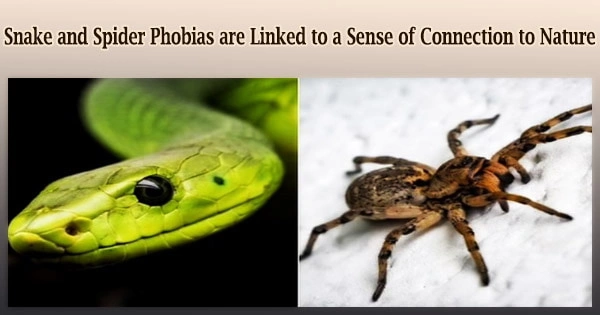For the first time, research of over a thousand people in Hungary has discovered that those who feel more connected to nature are less likely to have anxieties or phobias of snakes and spiders. The findings were published in People and Nature, a journal of the British Ecological Society.
Researchers from Hungary, the Czech Republic, and Portugal employed clinically validated questionnaires to assess participants’ fear of snakes and spiders, as well as their sense of connection to nature.
They discovered that persons who had a strong self-perceived connection to nature, such as a want to be close to nature and a desire to defend it, were less likely to have a strong fear of snakes and spiders.
Because of this link, the researchers believe that a connection to nature could be a protective factor against snake and spider phobias, two of the most common animal phobias.
Dr. Jakub Polák at Charles University, Czech Republic, and co-author of the study said: “Analysis of our data showed one clear picture: the more you like nature and feel a part of it, the less you are at risk of developing a snake or spider phobia, an anxiety disorders which can significantly lower your quality of life.”
Dr. Coelho at the University of Porto, Portugal, and co-author of the study, stressed that the association found in this study can go both ways: “A connection to nature may cause people to experience less fear of snakes and spiders. However, it is also possible that people with lower fear of snakes and spiders are consequently more interested in nature and feel a stronger connection with the natural environment.”
The researchers also gathered demographic information from the individuals, discovering that being older and living in less urbanized areas were both linked to a lower fear of snakes and spiders.
The findings add to the expanding body of data that spending time in nature and feeling connected to it has positive health, happiness, and stress-reduction impacts.
A connection to nature may cause people to experience less fear of snakes and spiders. However, it is also possible that people with lower fear of snakes and spiders are consequently more interested in nature and feel a stronger connection with the natural environment.
Dr. Coelho
Dr. András Norbert Zsido, at the University of Pécs, Hungary, and co-author of the study said: “Connectedness to nature, can have a wide range of positive effects. In our study we find that it may prevent the development of animal phobias or could facilitate coping with such fear if they already exist. It’s also been shown that being connected to nature carries health benefits and can result in more knowledge and a more positive attitude towards animals, along with greater environmental responsibility.”
Snake and spider phobia is supposed to have evolved in response to threats in our evolutionary past. While these concerns can protect us, having a phobia, or a severe or unreasonable fear, can cause significant discomfort and interfere with a person’s daily life as they attempt to avoid all contact with the phobic stimulus.
The Nature Relatedness Scale was used to examine the participants’ connection to nature in the study. This survey asks participants to agree or disagree with questions about conservation views, feelings of connection to nature, and how easy it is to be outside in the wilderness.
A stronger connection to nature is indicated by higher scores. The researchers employed known questionnaires used in clinical phobia screenings to assess participants’ fear of snakes and spiders.
After answering questions about fainting or avoiding snakes and spiders, participants were shown images of the animals and asked to rate them on three scales: whether they found the images to be unpleasant or pleasant, whether they felt calm or excited by the images, and whether they felt dominance or dominated by the animals in the pictures.
The researchers were unable to determine the direction of the relationship between connectedness to nature and animal concerns because the study was correlational and did not collect longitudinal data.
Dr. Zsido explained: “This was a cross-sectional study, so we were not able to measure possible effects of nature relatedness on fears over time. Whether pro-environmental education and increased time spent in natural environments could reliably decrease fears is still an open question.”
The researchers now want to see if their findings hold true for other animal phobias or if they can be applied to other civilizations throughout the world.
Dr. Polák said: “I would like to see if the same association between connectedness to nature and animal fears would be found in other countries with a different culture, different levels of urbanization, and potentially different attitudes towards animals. We suppose that fear of snakes and spiders is universal all over the world but is the protective role of nature connectedness universal as well? That would be worth future research.”
Understanding what causes animal phobias to persist also interests the researchers. Dr. Coelho added: “I would like to know why some people never seem to leave behind their fears, even if they have a lot of experience with the object that evokes the feeling. Is this due to the nature of the stimuli itself, or maybe to individual differences?”
















